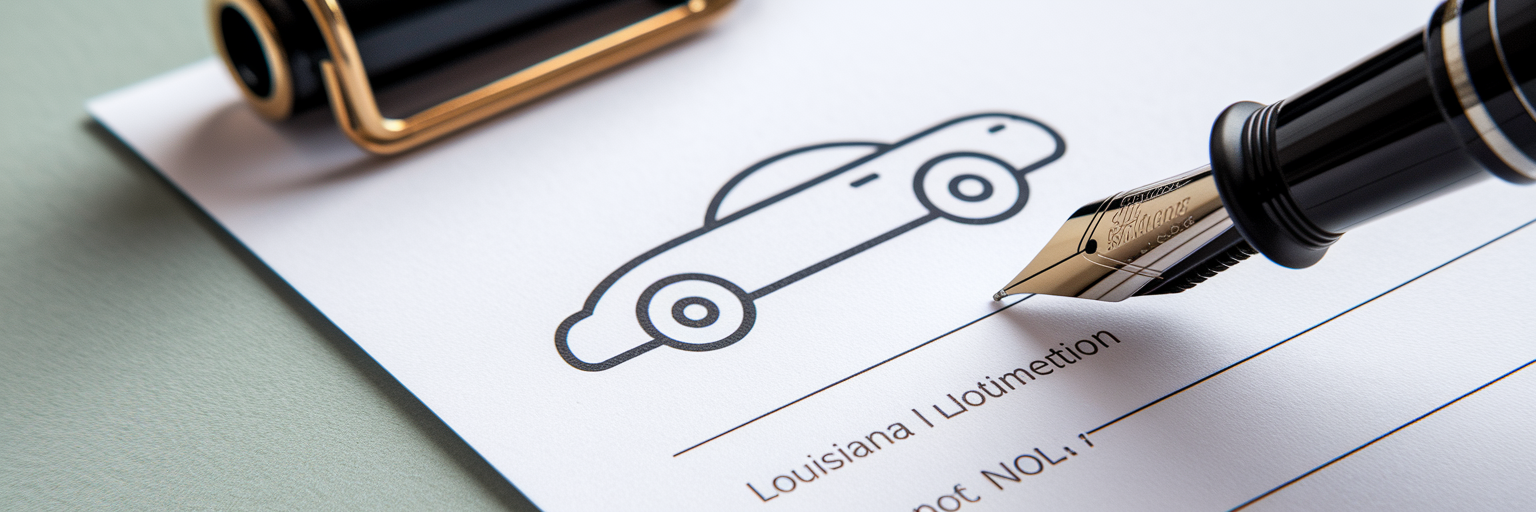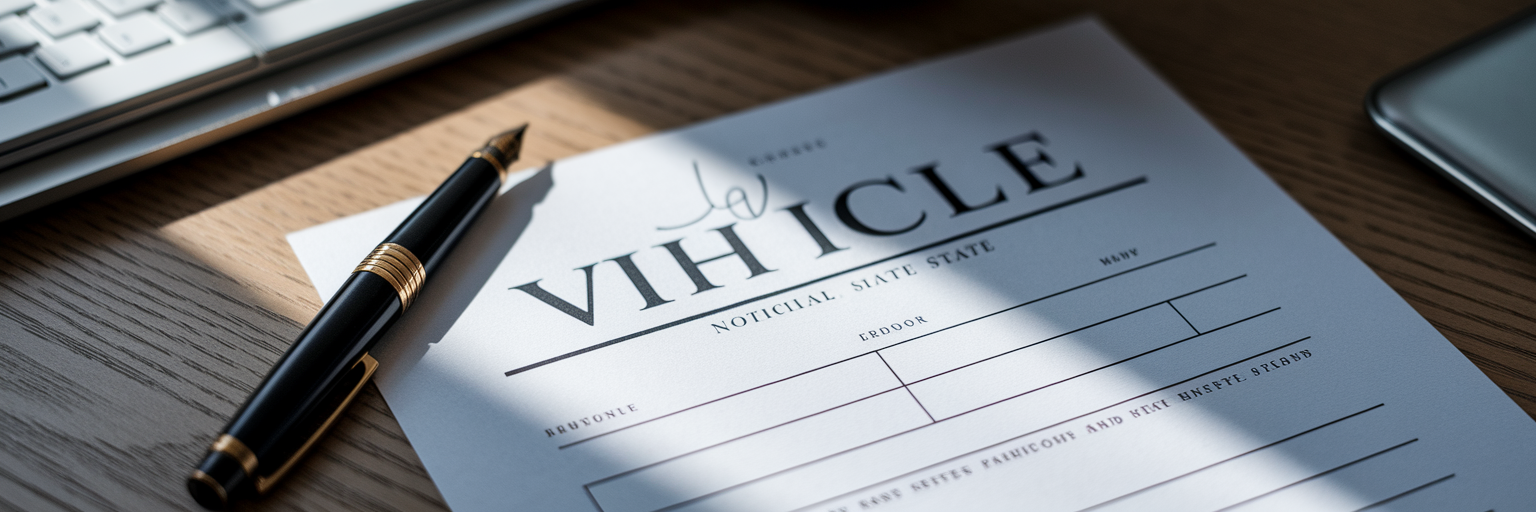Preventing Errors in Your Louisiana Auto Title Notarization

Each year, thousands of vehicles change hands in Louisiana, a process legally cemented by the notarization of the auto title. This crucial step, often perceived as a mere formality, is in fact a cornerstone of secure vehicle ownership and fraud prevention, making it essential to understand the process thoroughly.
Understanding Louisiana Auto Title Notarization Requirements
In Louisiana, the law mandates that vehicle titles be notarized to prevent fraud and clearly establish ownership. Think of it as the official handshake that validates the transfer. The key players in this are the seller, who is relinquishing ownership; the buyer, who is acquiring it; and the Notary Public, who acts as an impartial witness. To proceed with a Louisiana auto title notarization, you'll typically need the original Certificate of Title, a Bill of Sale (often called an Act of Sale of Movable in Louisiana), and valid government-issued photo identification for everyone signing. While these are standard, specific circumstances might have slight variations, so preparation is key. A Louisiana Notary Public is tasked with verifying the identity of the signers, ensuring they are signing willingly, and confirming they generally understand what the document means. For the most current details, buyers and sellers can consult resources like the Louisiana Office of Motor Vehicles website.
Step-by-Step Guide to Notarizing Your Vehicle Title
Now that you understand why these requirements are in place, let's walk through exactly how to notarize car title Louisiana. Following these steps can help ensure a smooth transfer:
- Seller's Preparation: The seller must accurately complete their section of the Certificate of Title. This includes the exact odometer reading (unless the vehicle is exempt), the sale price, and the date of sale. It’s absolutely vital that the seller does not sign the document until they are physically in the presence of the Notary Public. Signing beforehand can invalidate the notarization.
- Buyer's Review: The buyer should meticulously review all information filled in by the seller. Does the Vehicle Identification Number (VIN), make, model, and year on the title match the actual vehicle? Do the sale terms align with your agreement? Like the seller, the buyer must also wait to sign until they are before the notary.
- The Notary's Role: During the appointment, the Notary Public will first positively identify both the seller and buyer using their valid, unexpired government-issued photo IDs. They will then witness both parties sign the document. The notary may also administer an oath, for instance, regarding the accuracy of the odometer reading. Finally, the notary completes the notarial certificate on the title with their official signature and seal.
- Buyer's Post-Notarization Actions: With the notarized title in hand, the buyer’s job isn’t quite done. They must take the notarized Certificate of Title, the Bill of Sale, proof of Louisiana insurance, and any other required documents to the Louisiana Office of Motor Vehicles (OMV). This should be done promptly to officially register the vehicle in their name and obtain a new title and license plate.
Common Pitfalls in Louisiana Auto Title Notarization
Even with a clear understanding of the steps, certain missteps can derail the process. Knowing these common tripwires can help you avoid auto title mistakes and the headaches that follow. Many OMV rejections stem from simple, preventable errors.
- Incomplete or Incorrect Information: This is a frequent culprit. Missing signatures, names printed incorrectly or not at all, wrong dates, or an error in the Vehicle Identification Number (VIN) can all lead to problems. Even illegible handwriting can cause the OMV to reject the document, leading to significant delays.
- Odometer Disclosure Issues: The odometer reading is a critical piece of information. Common mistakes include failing to record the mileage, recording it inaccurately, or not checking the correct box if the mileage is "not actual" or "exceeds mechanical limits." Given the legal weight of odometer statements, accuracy here is paramount.
- Using Unacceptable or Expired Identification: Louisiana notaries are legally required to verify a signer's identity using specific forms of unexpired, government-issued photo ID. Showing up with an expired driver's license or an unacceptable form of ID means the notarization cannot proceed.
- Alterations on the Certificate of Title: Any erasures, use of white-out, or strike-throughs can void the entire title document. If a significant mistake is made, the seller typically must apply for a duplicate title from the OMV before the sale can proceed, which means more waiting and potential frustration.
This table summarizes frequent errors encountered during Louisiana auto title notarization, based on OMV guidelines and common notary experiences, to help individuals proactively avoid them and ensure a smooth vehicle title transfer Louisiana.
| Common Error | Why It's a Problem | How to Prevent It | Potential Consequence |
|---|---|---|---|
| Incomplete/Incorrect Seller/Buyer Info (Names, Addresses, Signatures, Dates) | Fails OMV requirements for clear chain of title; can indicate fraud. | Both parties carefully review all fields before signing. Notary verifies completeness. | OMV rejection, processing delays, potential need to re-do paperwork. |
| Odometer Disclosure Errors (Missing, inaccurate, wrong box checked) | Federal and state law violation; misrepresents vehicle value/condition. | Seller accurately records mileage. Buyer verifies. Notary ensures correct completion of odometer statement. | Fines, legal action, OMV rejection, difficulty reselling. |
| Using Expired or Unacceptable ID | Notary cannot legally verify signer's identity as required by Louisiana law. | All signers bring current, valid government-issued photo ID (e.g., driver's license, state ID, passport). | Notarization cannot proceed until valid ID is presented, causing delays. |
| Alterations on Title (Erasures, white-out, strike-throughs) | Voids the title document, raises suspicion of fraud, makes title non-transferable. | Complete the title carefully. If a major error occurs, seller must apply for a duplicate title *before* attempting sale. | Title voided, OMV rejection, significant delays, cost of duplicate title. |
Advantages of Using a Mobile Notary for Auto Titles
Given the potential for errors and the importance of getting it right, how can you make this process less of a burden? For many in Louisiana, a mobile notary service offers a compelling solution. The convenience and accessibility are significant benefits. Instead of coordinating schedules to meet at a fixed location, a mobile notary travels to your preferred spot, whether it's your home, office, or even a coffee shop in New Orleans or Jefferson Parish. This flexibility saves valuable time and reduces stress, especially for busy individuals or those who find travel challenging. Furthermore, experienced mobile notaries, like the professionals at JP Notary, bring specialized expertise directly to you. They are often well-versed in Louisiana's specific requirements for a vehicle title transfer Louisiana, helping to catch potential errors before they become problems. This on-the-spot assistance, guiding both buyer and seller through the document, ensures all fields are correctly completed, greatly reducing the risk of OMV rejection. For reliable mobile notary New Orleans services, consider contacting JP Notary at (504) 513-7333 for expert assistance.
Ensuring a Smooth Vehicle Transaction with Proper Notarization
Ultimately, a smooth vehicle transaction hinges on careful attention to detail from start to finish. Both buyers and sellers should meticulously review every detail on the Certificate of Title for accuracy before signing, and again immediately after notarization, prior to its submission to the OMV. Choosing a competent and experienced Louisiana Notary Public is another key step. A qualified notary, such as those at JP Notary, understands state-specific regulations and can significantly contribute to a legally sound and error-free transaction. Remember, proper notarization is more than a formality; it’s a crucial safeguard. It protects the interests of both parties by creating an official record of the transfer and verifying the identities and intent involved. A little diligence in the notarization process is a small investment of time that prevents larger headaches and ensures a successful vehicle ownership transfer in Louisiana.
Need Professional Notary Services?
Contact JP Notary for reliable, professional notary services in New Orleans.


